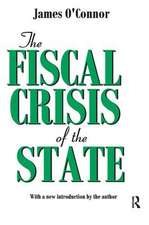Natural Causes: Essays in Ecological Marxism: Democracy and Ecology
Autor James O'Connoren Limba Engleză Paperback – 27 feb 1998
Preț: 315.57 lei
Nou
60.39€ • 62.30$ • 50.39£
Carte tipărită la comandă
Livrare economică 26 martie-09 aprilie
Specificații
ISBN-10: 1572302739
Pagini: 350
Ilustrații: Illustrations
Dimensiuni: 152 x 229 x 23 mm
Greutate: 0.54 kg
Ediția:New
Editura: Guilford Publications
Colecția Guilford Press
Seria Democracy and Ecology
Public țintă
Professional Practice & Development and UndergraduateCuprins
I. History and Nature
Introduction to Part I
1. Culture, Nature, and the Materialist Conception of History
2. What Is Environmental History? Why Environmental History?
3. Three Ways to Look at the Ecological History and Cultural Landscapes of Monterey Bay
4. The Nature of Construction and the Construction of Nature at Fall Creek, Felton, California, 1860 1990: A Script
5. The Sales of Two Cities: Chicago and Los Angeles
II. Capitalism and Nature
Introduction to Part II
6. Some Observations on Ecological Crisis
7. The Conditions of Production and the Production of Conditions
8. The Second Contradiction of Capitalism, with an Addendum on the Two Contradictions of Capitalism
9. On Capitalist Accumulation and Economic and Ecological Crisis
10. Uneven and Combined Development and Ecological Crisis
11. Technology and Ecology
12. Murder on the Orient Express: The Political Economy of the Gulf War
13. British Rule in Shetland
14. Is Sustainable Capitalism Possible?
III. Socialism and Nature
Introduction to Part III
15. Socialism and Ecology
16. A Red Green Politics in the United States?
17. Flatland Politics
18. Think Globally, Act Locally? Toward an International Red-Green Movement
19. Ecology Movements and the State
20. The New Global Economy and One Alternative
21. What Is Ecological Socialism?
Notă biografică
Recenzii
The neo-liberal pundits who dance on Marx's grave will hate this book. Whether exposing the hidden logic of the Gulf War or deciphering the relations of production in a new-growth forest, Natural Causes is an intellectual tour de force. James O'Connor, once again, demonstrates that he is America's most original social theorist. --Mike Davis, author of City of Quartz and Ecology of Fear
The good news is that the environmental and socialist movements are beginning to create a dialogue, which can immeasurably strengthen both. James O'Connor has been one of the country's leading intellectual figures in that dialogue, and his new book shows, in a compelling, sophisticated way, how both movements must come together. --Donald Worster, Hall Distinguished Professor of American History, University of Kansas
Descriere
Economic growth since the Industrial Revolution has been achieved at great cost both to the natural environment and to the autonomy of communities. What can a Marxist perspective contribute to understanding this disturbing legacy, and mitigating its impact on future generations? Renowned social theorist James O'Connor shows how the policies and imperatives of business and government influence--and are influenced by--environmental and social change. Probing the relationship between economy, nature, and society, O'Connor argues that environmental and social crises pose a growing threat to capitalism itself. These illuminating essays and case studies demonstrate the power of ecological Marxist analysis for understanding our diverse environmental and social history, for grounding economic behavior in the real world, and for formulating and evaluating new political strategies.







